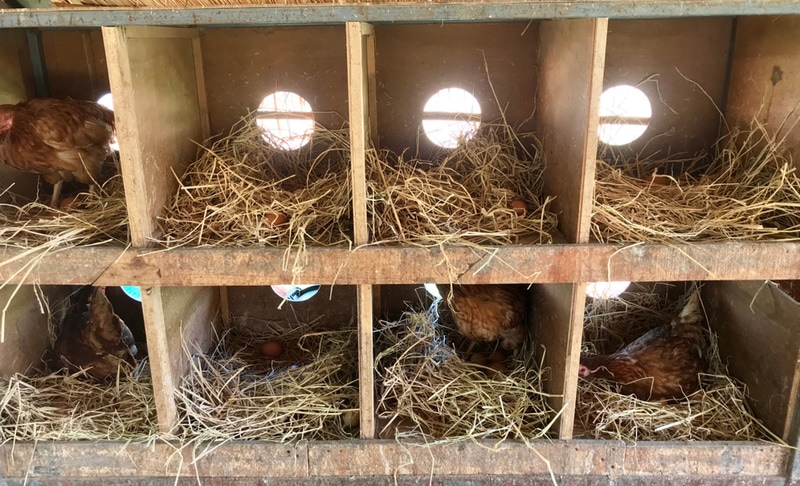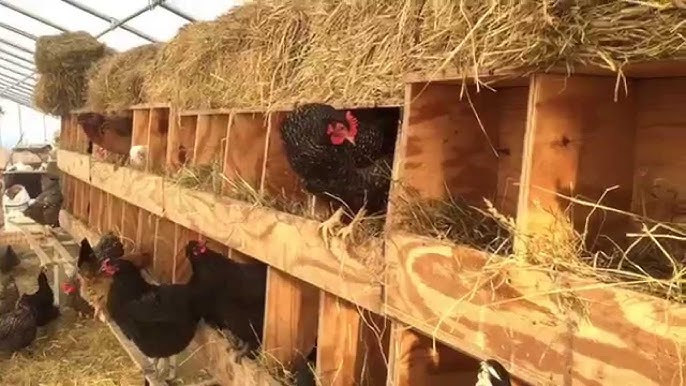For many chicken owners, the sight of chickens sleeping in nesting boxes can be a curious or even frustrating occurrence. These boxes are primarily intended for laying eggs, not for roosting. Understanding why chickens might choose to sleep there and how to manage this behavior is crucial for maintaining a healthy and productive flock.

Why Do Chickens Sleep in Nesting Boxes?
The behavior of chickens sleeping in nesting boxes can often be attributed to several factors. Understanding these can help in managing and possibly redirecting their behavior.
Comfort and Warmth
Nesting boxes often provide a cozy and warm environment, especially during colder months. Chickens naturally seek out places that offer comfort and protection from the elements.
Flock Dynamics
In some cases, the social hierarchy within the flock can influence where chickens choose to sleep. Dominant birds might occupy the prime roosting spots, leaving less dominant ones to seek alternative sleeping arrangements in nesting boxes.
Potential Issues with Chickens Sleeping in Nesting Boxes
While it might seem harmless, chickens sleeping in nesting boxes can lead to several problems that affect both the chickens and their eggs.
Dirty Eggs
When chickens sleep in nesting boxes, they can soil the nests with droppings, leading to dirty eggs. This not only affects egg cleanliness but can also increase the risk of disease transmission.
Nesting Box Wear and Tear
Frequent use of nesting boxes as sleeping quarters can lead to increased wear and tear, necessitating more frequent repairs or replacements.
Strategies to Manage Nesting Box Sleeping
To address the issue of chickens sleeping in nesting boxes, consider implementing some of these strategies:
Provide Adequate Roosting Space
Ensuring that there is enough roosting space for all chickens can help discourage them from using nesting boxes as sleeping spots. Roosts should be higher than nesting boxes to appeal to their natural instincts.
Block Off Nesting Boxes at Night
Blocking access to nesting boxes during the night can prevent chickens from using them as sleeping areas. This can be done by simply covering the boxes with a board or other material.
Enhance Roosting Area Comfort
Improving the comfort of the roosting area by adding soft bedding or adjusting the height and width of roosts can make them more appealing.
Benefits of Proper Sleeping Arrangements
Encouraging chickens to sleep in appropriate areas offers numerous benefits for both the flock and their owners.
Healthier Chickens
Proper sleeping arrangements help maintain hygiene and reduce the risk of disease, leading to healthier chickens.
Better Egg Production
Clean and undisturbed nesting boxes promote better egg production and quality, as hens are more likely to lay eggs in clean environments.
Conclusion: Fostering Healthy Habits
Addressing the issue of chickens sleeping in nesting boxes requires understanding and patience. By creating an environment that encourages chickens to sleep in appropriate areas, owners can ensure the health and productivity of their flock.
For more detailed guidance on managing your flock’s sleeping habits, you can explore various chicken nesting box ideas and coop designs to find what works best for your setup.

FAQs on Chickens Sleeping in Nesting Boxes
Why are my chickens sleeping in nesting boxes?
Chickens might sleep in nesting boxes due to comfort, warmth, or flock dynamics. Ensuring adequate roosting space can help address this behavior.
How can I stop my chickens from using nesting boxes as beds?
You can discourage this by providing sufficient roosting areas, blocking boxes at night, and enhancing roost comfort.
What are the consequences of chickens sleeping in nesting boxes?
This can lead to dirty eggs and increased wear on nesting boxes, affecting both egg quality and coop maintenance.
This article contains affiliate links. We may earn a commission at no extra cost to you.










